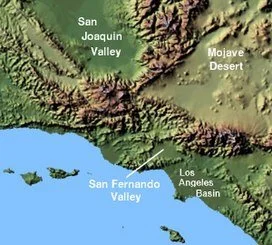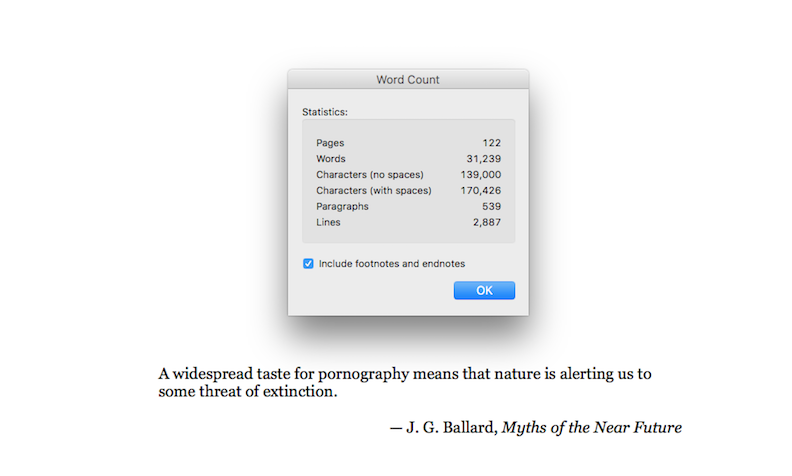The Most Dangerous Game
About | Consulting I Email
About | Consulting I Email
On Substack’s Lit Mag Lounge, there’s a new interview with me on my fiction writing process, “Publishing Diaries: Susannah Breslin”: “I committed myself to an experiment: Could I write about this provocative subject matter—the adult movie business—and what someone who works in the adult movie business would describe as a ‘civilian’s’ encounter with it in a style that could be published in The New Yorker?”
About I My Book I Newsletter I X I Instagram I LinkedIn I Consulting I Email
“In July of 2023, I found myself standing in John Holmes’ footprints.” Read my latest newsletter and subscribe.
About I My Book I Newsletter I X I Instagram I LinkedIn I Consulting I Email

“Outside, there was lightning, but no thunder.” On my website, I republished a fictional short story I wrote years ago that was originally published by Contrary in 2016: “Storm Clouds Over the State of Louisiana.”
About I My Book I Newsletter I X I Instagram I LinkedIn I Consulting I Email
I wrote a short story about a sexagenarian who discovers an adult movie is being filmed in the house behind his. More recently, I was interviewed about it. When that interview gets published online, I’ll share the link.
About I My Book I Newsletter I X I Instagram I LinkedIn I Consulting I Email
I posted a piece of flash fiction from years ago on my website: “The Boy Who Wore His Heart on His Sleeve.”
About I My Book I Newsletter I X I Instagram I LinkedIn I Consulting I Email
“What would you do if you discovered an adult movie was being filmed in the house behind yours?” Read it.
About I My Book I Newsletter I X I Instagram I LinkedIn I Consulting I Email
I’m happy to share that a new short story I wrote, “Topical Matters,” has been published on failbetter. This story was inspired by a visit I paid to an adult movie set last year. The story line involves a sexagenarian in the San Fernando Valley who discovers that an adult movie is being filmed in the house behind his house.
Here’s how it begins:
“Stuart should have known something would happen on that day when he opened the door in the morning to retrieve the newspaper and noticed a religious tract had been left on the porch. He bent over, winced from the pain in his back, and scooped up the pamphlet. What is the Mark of the BEAST, read the cover. All the words were white except for the last word that was an alarming red. From the stormy sky behind the message, a bolt of lightning reached down to strike a building that was half the Vatican and half the U.S. Capitol.”
Read the rest here.
About I My Book I Newsletter I X I Instagram I LinkedIn I Consulting I Email

Image via Wikipedia
One of the books I’m working on at the moment is a short story collection. The title is: Fables of the 818. The interrelated stories take place in the San Fernando Valley—at strip clubs, porn sets, and massage parlors.
About I My Book I Newsletter I X I Instagram I LinkedIn I Consulting I Email

Yesterday I reached the halfway point in my novel, which is set in the San Fernando Valley’s adult movie industry. As seen here, with the book’s epigraph. Only the rest of the way left to go. Onward and upward.
About I My Book I Newsletter I X I Instagram I LinkedIn I Consulting I Email
In my latest newsletter, I share what my novel, the adult industry, and fictional literary maps have in common.
About I My Book I Newsletter I X I Instagram I LinkedIn I Consulting I Email
This is part 23 of Fuck You, Pay Me, an ongoing series of posts on writing, editing, and publishing.
It was the best of times, it was the worst of times, it was June. Here are a few things on my radar.
Just Say No This month I found myself in the midst of negotiating a publishing contract. The money was so-so, but the real issue was the dramatic rights. If you’re not aware, dramatic rights have to do with who has the right to turn the property that you’ve written into a movie, television series, or the like. Statistically, the odds are slim that your written property will be turned into a movie, television series, or the like, but they’re not zero. You’ll see a range of guesstimates about how likely it is that your intellectually property will be optioned, but whatever the number is, it is surely less than 1%. That said, never say never, and these days, when content is everywhere, it’s important that you retain as many rights as you can. Let’s just say Netflix or Scorsese or some producer comes inquiring about turning your words into a movie or TV show or some other sort of project like that. Do you want to be the one who has to say, oh, yes, well, actually I gave that away for a pittance? No, you do not. In fact, when I was a younger writer, dramatic rights were not on the table, or at least not so often. Somewhere around, say, the 2010s, publishers began attempting to make a land grab for these rights, and certain writers, let’s say, millennials, gave them away because they just wanted to be published. Nowadays, every Tom, Dick, and Harry is trying to steal your dramatic rights. But if your project is optioned and turned into a movie or TV show, you may make more money with that than you ever did with the word-based version. So keep your dramatic rights. I ended up passing on their offer. Which is a bummer. For them, mostly.
Get Money Last month, I wrote about how a TV show had reached out to me about using some of my photographs as part of a set that they were creating for the third season of this show, which airs on one of the streaming networks. After some negotiation, we settled on a fee. A friend of mine had advised me that this network was sometimes slow in paying, so I had a clause added to the agreement that payment was due upon receipt. A couple weeks later, I was paid, but by that time the individuals who had worked with me were no longer working on the show. Which is to say, make sure you don’t just get getting paid in writing, make sure you get in writing when you will be paid, or you might end up chasing payment forever.
Be a Star Recently, I’ve gotten into telling stories in public forums. Last month, I read an excerpt from a short story I wrote at a bookstore. Last weekend, I read an essay adapted from my memoir at a basement club that hosts performances. Next week, I’m going to perform a story I wrote based on dating in Los Angeles at a bigger event. Why am I doing this? I’m not really sure. While I’ve been on TV many times, and read my work many times, and been part of an improv group, performing is a scary thing. But I thought it was important to keep pushing myself, trying new things, telling stories in new ways. Besides, this is Los Angeles. You never know who’ll be in the audience, where it might lead, how your story might land.
About I My Book I Newsletter I X I Instagram I LinkedIn I Consulting I Email
This short story was written by me and originally published in Opium Magazine in 2003.
When all the men were gone, that was when the women realized they were sorry. It had been a long time coming, the women saw in hindsight. One by one, the men had left, the woman recalled. The men had their briefcases at their sides, their suitcases on their leashes, their luggage strapped across the widest parts of their shoulders. "Goodbye!" the men had called out to the women. The women should have known. At first, the women had been happy. Now, they had time to shop at strip malls, and get their nails polished in pink or peach, and talk to each other about each other across the freed up phone lines. They had all the time in the world in a world without men. "Hello!" the women screamed out to each other across the deserted city streets. Inside their homes, the women cooked TV dinners for one, and sat down on toilet seats without checking first, and figured out how to use all the remote controls. Eventually, they even got into the White House, and learned how to kill cows for one another, and changed each other's tires by the sides of the roads. A long time after all the men were gone, when the women had settled down into their lives at last, the women sat there like that for one day, and they were content. The next day, though, the women began to fidget, and several of them scratched their heads, and a couple of them yawned. In the darkness of their closets, and the isolation of their cars, and back behind their mildewing shower curtains, the women whispered to themselves, "Those men, they weren't so bad." And the women began to wonder if the men being gone was not such a good thing, after all. Too late, the women decided, it was.
About I My Book I Newsletter I X I Instagram I LinkedIn I Consulting I Email
In my latest newsletter, I wrote about writing a short story about the adult movie industry. Read and subscribe.
About I My Book I Newsletter I X I Instagram I LinkedIn I Consulting I Email
I’m happy to share I’ll be reading on Saturday, May 24, 2025, at 7 pm as part of Space Stories: A Variety Show at The Pop-Hop Books Co-op in Highland Park, Los Angeles. I’ll be reading an excerpt from “Topical Matters,” an unpublished short story I wrote about a sexagenarian who discovers an adult movie is being filmed in the house behind his house in the San Fernando Valley. You can buy event tickets here.
About I My Book I Newsletter I X I Instagram I LinkedIn I Consulting I Email
Nearly 30 years ago, I had my first short story published in an anthology. The story was “Apartment,” and it appeared in Chick Lit 2. Now, I’ve published the story online for the first time. This work of fiction features boobs, a dog, and a man who may be losing his mind. If you’re upset by adult themes, don’t read it.
About I My Book I Newsletter I X I Instagram I LinkedIn I Consulting I Email

This is part 21 of “Fuck You, Pay Me,” an ongoing series of posts on writing, editing, and publishing.
Currently, I’m writing a novel set in Porn Valley. For the sake of this post, let’s call it Untitled Porn Valley Novel. (In fact, the book has a title, but let’s deem it untitled for this post.) Since finding myself on an adult movie set for the first time nearly three decades ago, I’ve been searching for the best way to tell this story about this curious place. Here are a few things I’ve learned along the way.
Immerse yourself in your subject. I haven’t lived in Los Angeles the entire time I’ve been writing about the adult industry, but I’ve lived here quite a bit. Initially, I lived in Los Feliz, which is on the east side of Los Angeles, not in the San Fernando Valley. Now, I live in the Valley, which is more of an embed. When I’m writing something in the novel and I get stuck, I can drive to where that section takes place and get inspired. The novel is twelve chapters, and each chapter takes place in a different part of the Valley over the course of a single day. That said, the Porn Valley I’ve created is a work of fiction. It’s my Yoknapatawpha County.
See what you haven’t seen. As a journalist writing about the porn industry, I’ve seen a lot of things. Suffice to say, when Martin Amis described the porn business as a “rough trade,” he was not incorrect. Sometimes, the manufacturing of pornography is a space in which things get extreme. (Take, for example, “500 Men. 1 Woman. Get in Line.”) I can’t unsee what I’ve seen. So what am I to do with these scenes in my mind? These real-life experiences have shaped my work as a novelist. As a reporter, I bear witness. As a fiction writer, I recreate what I have seen anew. The process is alchemical. Something gets transformed.
Write it in pieces. The only way I was able to move through the manuscript productively was to write it in 500-word chunks. Each of the twelve chapters is approximately 5,000 words, and each chapter has 10 sections of approximately 500 words. Instead of “writing a novel,” I’m meeting a word goal. Attaining these smaller word goals was the way to write a book-length work. Maybe that method works for you, or maybe it doesn’t. But it works for me. Ultimately, I may merge those 10 sections in the chapter into one continuous whole for the chapter. Or I may not. That’s a question for revision, not for creating.
Do a bad job. As a perfectionist, I can get stuck on getting things right. The bar is set high, and I can get bogged down in trying to meet it. People always say to write a messy first draft; the idea of doing that makes me want to claw out my eyes. It’s almost intolerable. Eventually, though, I was able to realize that some chapters would be tighter than others, and some chapters would be more exploratory than others. Take it from Robert Frost: “the best way out is always through.” Or John Swartzwelder: “Since writing is very hard and rewriting is comparatively easy and rather fun, I always write my scripts all the way through as fast as I can, the first day, if possible.” Or William Faulkner: “The main thing is—is to get it down.”
Become someone else. I tried to write this novel in many different ways, and I could never quite get it right. For years, the main character eluded me. Then I wrote a short story about a character I fell in love with, and I realized that this person was the main character in my novel. This time around, the main character in my novel is a man, and that works for me. For as long as I am writing my novel, I am someone else: who is the opposite of me and very much me, who is totally lost and hoping to be found, who is wrestling with their demons and seeking transcendence. In reality, he’s my doppelgänger, but in the world of fantasy, he’s all mine.
About I My Book I Newsletter I X I Instagram I LinkedIn I Consulting I Email
I loved Chantal Montellier’s Social Fiction. It’s a feminist 1984, a dark vision of the search for love in the midst of a dystopia, a collection of comics in which being human is a crime and death lurks around every corner. Despite the bleak subject matter, Montellier’s dynamic art rockets through time and captures the beauty of what perseverance looks like when independent thought and freedom have been criminalized.
About I My Book I Newsletter I X I Instagram I LinkedIn I Consulting I Email
Have you checked out my storefront on Gumroad lately? You can hire me as a consultant; buy a signed copy of my memoir, Data Baby, My Life in a Psychological Experiment; or download a copy of a short story I wrote.
I was really looking forward to reading this graphic novel adaptation of Cormac McCarthy’s The Road by Manu Larcenet, and I was equally disappointed. The book looks impressive: Hardback! Generously sized! Nicely printed! But the contents amount to a grim, underwhelming, forced march (ha!) through a hellscape that reduces McCarthy’s brilliant novel into snatches of dialogue that amount to nothing. Where is the literary-ness? Where is the lyricism? Where is the new thing ideally produced when a work is adapted into another form? Not here. I’m not fundamentally opposed to graphic adaptations of literary works—I loved Brad Ricca and Courtney Sieh’s artful adaptation of Nellie Bly’s Ten Days in a Mad-House—but this ain’t it.
About I My Book I Newsletter I X I Instagram I LinkedIn I Consulting I Email